Report on DOC Accomplishments in Space Commerce
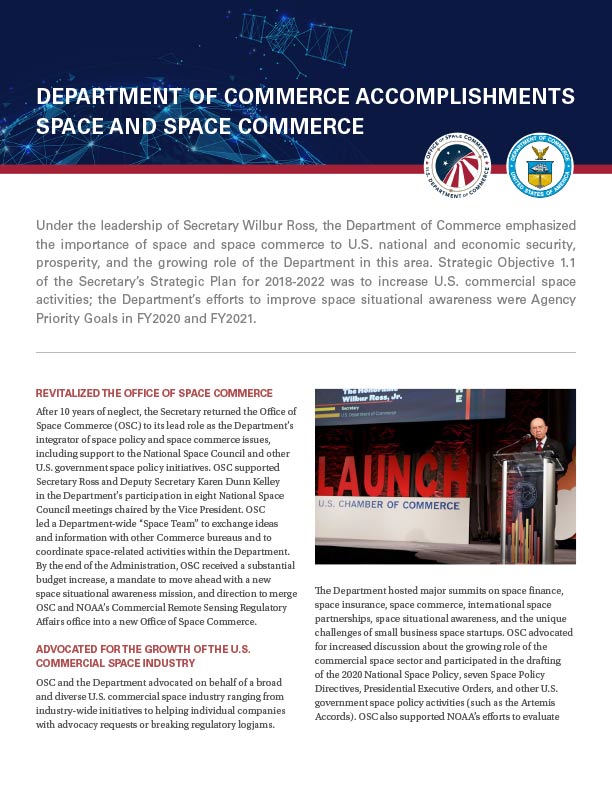
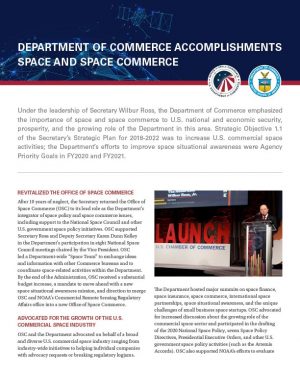
View report as PDF (1.8 MB)Today, the Office of Space Commerce published a report on the Commerce Department’s space commerce accomplishments under Secretary Wilbur Ross and the Trump Administration.
The report recaps the Department’s success in achieving its strategic objective to expand commercial space activities through a host of actions. The text of the report is below.
DEPARTMENT OF COMMERCE ACCOMPLISHMENTS
SPACE AND SPACE COMMERCE
 Under the leadership of Secretary Wilbur Ross, the Department of Commerce emphasized the importance of space and space commerce to U.S. national and economic security, prosperity, and the growing role of the Department in this area. Strategic Objective 1.1 of the Secretary’s Strategic Plan for 2018-2022 was to increase U.S. commercial space activities; the Department’s efforts to improve space situational awareness were Agency Priority Goals in FY2020 and FY2021.
Under the leadership of Secretary Wilbur Ross, the Department of Commerce emphasized the importance of space and space commerce to U.S. national and economic security, prosperity, and the growing role of the Department in this area. Strategic Objective 1.1 of the Secretary’s Strategic Plan for 2018-2022 was to increase U.S. commercial space activities; the Department’s efforts to improve space situational awareness were Agency Priority Goals in FY2020 and FY2021.
Revitalized the Office of Space Commerce
After 10 years of neglect, the Secretary returned the Office of Space Commerce (OSC) to its lead role as the Department’s integrator of space policy and space commerce issues, including support to the National Space Council and other U.S. government space policy initiatives. OSC supported Secretary Ross and Deputy Secretary Karen Dunn Kelley in the Department’s participation in eight National Space Council meetings chaired by the Vice President. OSC led a Department-wide “Space Team” to exchange ideas and information with other Commerce bureaus and to coordinate space-related activities within the Department. By the end of the Administration, OSC received a substantial budget increase, a mandate to move ahead with a new space situational awareness mission, and direction to merge OSC and NOAA’s Commercial Remote Sensing Regulatory Affairs office into a new Office of Space Commerce.
Advocated for the Growth of the U.S. Commercial Space Industry
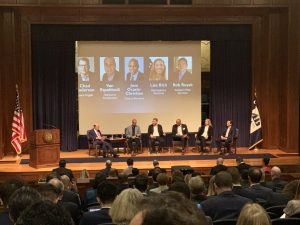 OSC and the Department advocated on behalf of a broad and diverse U.S. commercial space industry ranging from industry-wide initiatives to helping individual companies with advocacy requests or breaking regulatory logjams. The Department hosted major summits on space finance, space insurance, space commerce, international space partnerships, space situational awareness, and the unique challenges of small business space startups. OSC advocated for increased discussion about the growing role of the commercial space sector and participated in the drafting of the 2020 National Space Policy, six Space Policy Directives, Presidential Executive Orders, and other U.S. government space policy activities (such as the Artemis Accords). OSC also supported NOAA’s efforts to evaluate and purchase commercial satellite data designed to improve weather forecasting. During the Administration, the International Trade Administration’s (ITA) Advocacy Center had eight wins in the space sector with a total value of $563.3 million with $463.3 million in export content. By the end of 2020, ITA had 33 overseas cases involving U.S. launch services, satellites, satellite applications, sensors, ground station, and support equipment with a total value of $7.5B, including approximately $7.1B in export content. ITA’s SelectUSA program welcomed two space companies to the United States, Astroscale and iSpace, both from Japan.
OSC and the Department advocated on behalf of a broad and diverse U.S. commercial space industry ranging from industry-wide initiatives to helping individual companies with advocacy requests or breaking regulatory logjams. The Department hosted major summits on space finance, space insurance, space commerce, international space partnerships, space situational awareness, and the unique challenges of small business space startups. OSC advocated for increased discussion about the growing role of the commercial space sector and participated in the drafting of the 2020 National Space Policy, six Space Policy Directives, Presidential Executive Orders, and other U.S. government space policy activities (such as the Artemis Accords). OSC also supported NOAA’s efforts to evaluate and purchase commercial satellite data designed to improve weather forecasting. During the Administration, the International Trade Administration’s (ITA) Advocacy Center had eight wins in the space sector with a total value of $563.3 million with $463.3 million in export content. By the end of 2020, ITA had 33 overseas cases involving U.S. launch services, satellites, satellite applications, sensors, ground station, and support equipment with a total value of $7.5B, including approximately $7.1B in export content. ITA’s SelectUSA program welcomed two space companies to the United States, Astroscale and iSpace, both from Japan.
Promoted International Space Cooperation
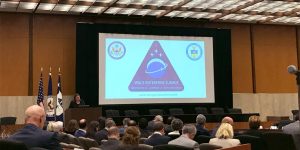 Secretary Ross signed a landmark Space Cooperation Agreement with the Government of Luxembourg in May 2019, on behalf of the U.S. government, covering a wide range of civil, scientific, and commercial activities. The Secretary also signed a declaration of intent to cooperate with the French Space Agency, CNES, in the area of space situational awareness in October 2019. Secretary Ross presided over the signing of a joint statement in September 2019 declaring the Australian Space Agency’s intent to join NASA’s Moon exploration program. Deputy Secretary Kelley led the Commerce Department’s participation in the Space Enterprise Summit (co-hosted with the State Department) to discuss the changing nature of traditional and emerging space partnerships. OSC represented the Department in the annual U.S.-Japan Comprehensive Space Dialogue and in bilateral discussions with the Commonwealth countries, European Union, Luxembourg, Indonesia, Singapore, Thailand, United Arab Emirates, and others. OSC also promoted the growing role of private sector space activities as part of the U.S. delegation to the United Nations Committee on the Peaceful Uses of Outer Space.
Secretary Ross signed a landmark Space Cooperation Agreement with the Government of Luxembourg in May 2019, on behalf of the U.S. government, covering a wide range of civil, scientific, and commercial activities. The Secretary also signed a declaration of intent to cooperate with the French Space Agency, CNES, in the area of space situational awareness in October 2019. Secretary Ross presided over the signing of a joint statement in September 2019 declaring the Australian Space Agency’s intent to join NASA’s Moon exploration program. Deputy Secretary Kelley led the Commerce Department’s participation in the Space Enterprise Summit (co-hosted with the State Department) to discuss the changing nature of traditional and emerging space partnerships. OSC represented the Department in the annual U.S.-Japan Comprehensive Space Dialogue and in bilateral discussions with the Commonwealth countries, European Union, Luxembourg, Indonesia, Singapore, Thailand, United Arab Emirates, and others. OSC also promoted the growing role of private sector space activities as part of the U.S. delegation to the United Nations Committee on the Peaceful Uses of Outer Space.
Advanced Regulatory Reform
NOAA’s General Counsel, CRSRA, and OSC advanced a highly innovative rule governing private remote sensing satellite systems that dramatically decreased licensing timelines, increased transparency for businesses, and imposed conditions only where merited by global market conditions. OSC also led an interagency working group designed to improve technical, economic, and industry analysis to inform FCC rulemaking on orbital debris and other U.S. government space safety initiatives. OSC and the Bureau of Industry and Security continued efforts to streamline space export controls. OSC published a plain language guide to the U.S. export control system for commercial space companies.
Created and Implemented a Mission Authorization Framework for Novel Space Activities
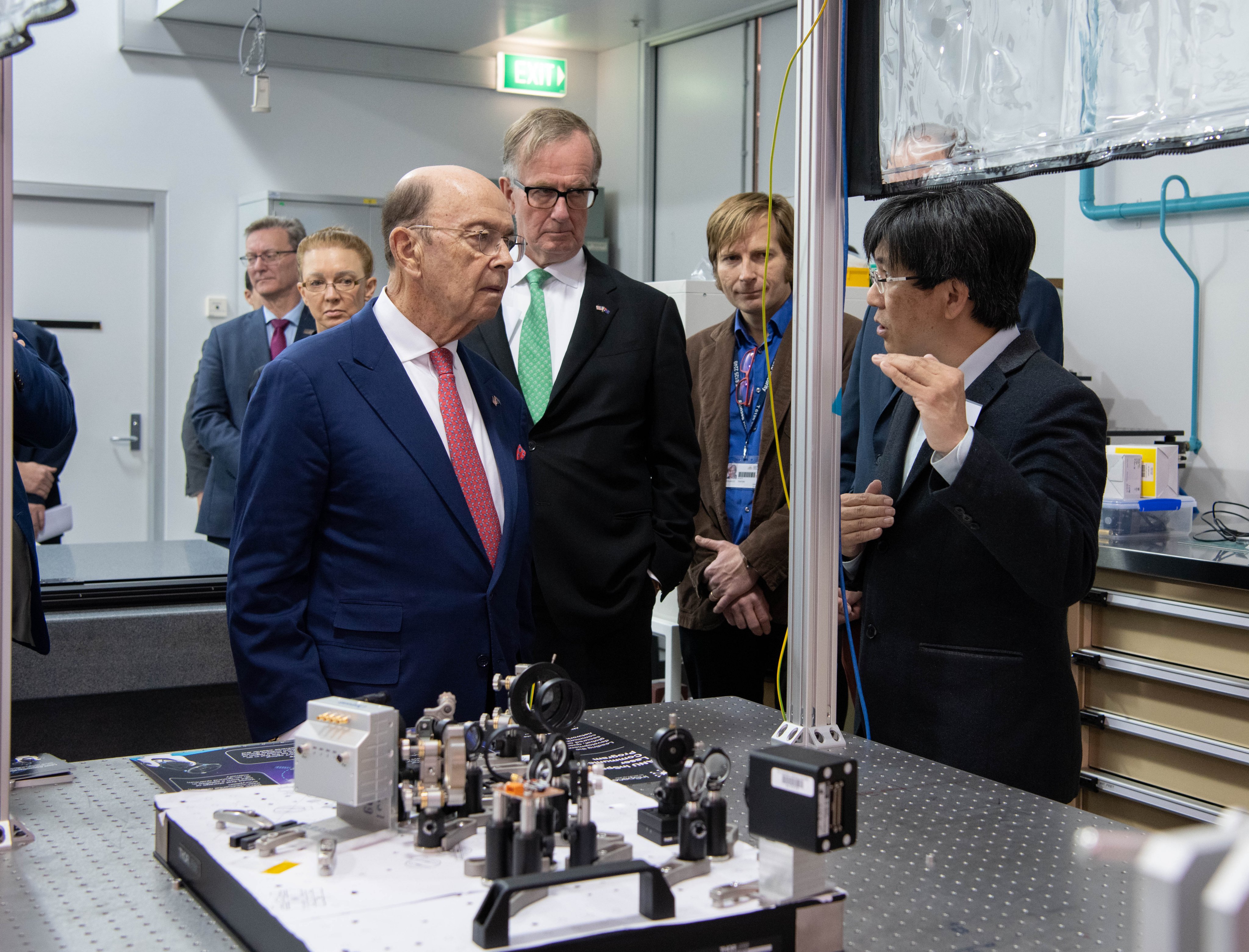
Developed Innovative Approaches to Improve Space Safety and Sustainability
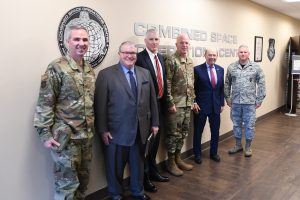 In response to Space Policy Directive-3, the Department advanced a wide range of initiatives designed to improve the Nation’s space situational awareness capabilities and perform the lead civil agency role in enhancing space traffic management and other space safety activities. OSC established key partnerships with the Department of Defense (DoD), United States Air Force, United States Space Force, and NASA in developing plans for an open architecture data repository (OADR) that will serve as a trusted platform for the collection and analysis of DoD, civil agency, commercial, and international data related to space safety. The OADR will ultimately serve as the authoritative source of conjunction notification warnings to private sector and international space operators. Under a “whole of Commerce” strategy, OSC drew upon expertise such as the NOAA’s satellite operations enterprise, especially as it pertains to flight safety, collision avoidance, and use of commercial providers in four orbit regimes and on the ground. OSC partnered with NOAA’s Big Data Project to host initial data sets, including space weather, in a prototype for the OADR. A DoC-DoD MOU will guide specific technical developments over the next few years.
In response to Space Policy Directive-3, the Department advanced a wide range of initiatives designed to improve the Nation’s space situational awareness capabilities and perform the lead civil agency role in enhancing space traffic management and other space safety activities. OSC established key partnerships with the Department of Defense (DoD), United States Air Force, United States Space Force, and NASA in developing plans for an open architecture data repository (OADR) that will serve as a trusted platform for the collection and analysis of DoD, civil agency, commercial, and international data related to space safety. The OADR will ultimately serve as the authoritative source of conjunction notification warnings to private sector and international space operators. Under a “whole of Commerce” strategy, OSC drew upon expertise such as the NOAA’s satellite operations enterprise, especially as it pertains to flight safety, collision avoidance, and use of commercial providers in four orbit regimes and on the ground. OSC partnered with NOAA’s Big Data Project to host initial data sets, including space weather, in a prototype for the OADR. A DoC-DoD MOU will guide specific technical developments over the next few years.
In this regard, OSC established ongoing partnerships with key international partners (e.g., the EU’s Space Surveillance and Tracking Consortium, Government of Japan) to encourage foreign civil and commercial participation in the OADR. In close partnership with American industry, OSC and NIST participated in the International Organization for Standardization, other standards bodies, and United Nations working groups designed to advance “bottom-up” voluntary guidelines and technical standards for improved space traffic coordination. A Congressionally-mandated, independent study by the National Academy of Public Administration reaffirmed OSC and the Department as “best suited” to perform civil space traffic management functions, based on these activities.
Developed New Economic Statistics for the Space Economy
The Bureau of Economic Analysis (BEA), in partnership with international and industry experts, developed new methods for measuring and tracking developments in the space economy. BEA published the first set of experimental space economy statistics in December 2020, consistent with accounting measures used to estimate GDP and other national economic statistics. This effort received recognition from the National Space Council and other White House economic organizations, and attracted attention from foreign space agencies and economic/statistics ministries. The statistics will help improve our understanding of the space economy and help drive new investment, workforce, and other decisions. Separately, BIS began a new study on trends in the space industrial base on behalf of NASA and NOAA.
Emphasized the Role of a Wider Range of Economic Initiatives to Support the U.S. Commercial Space Industry
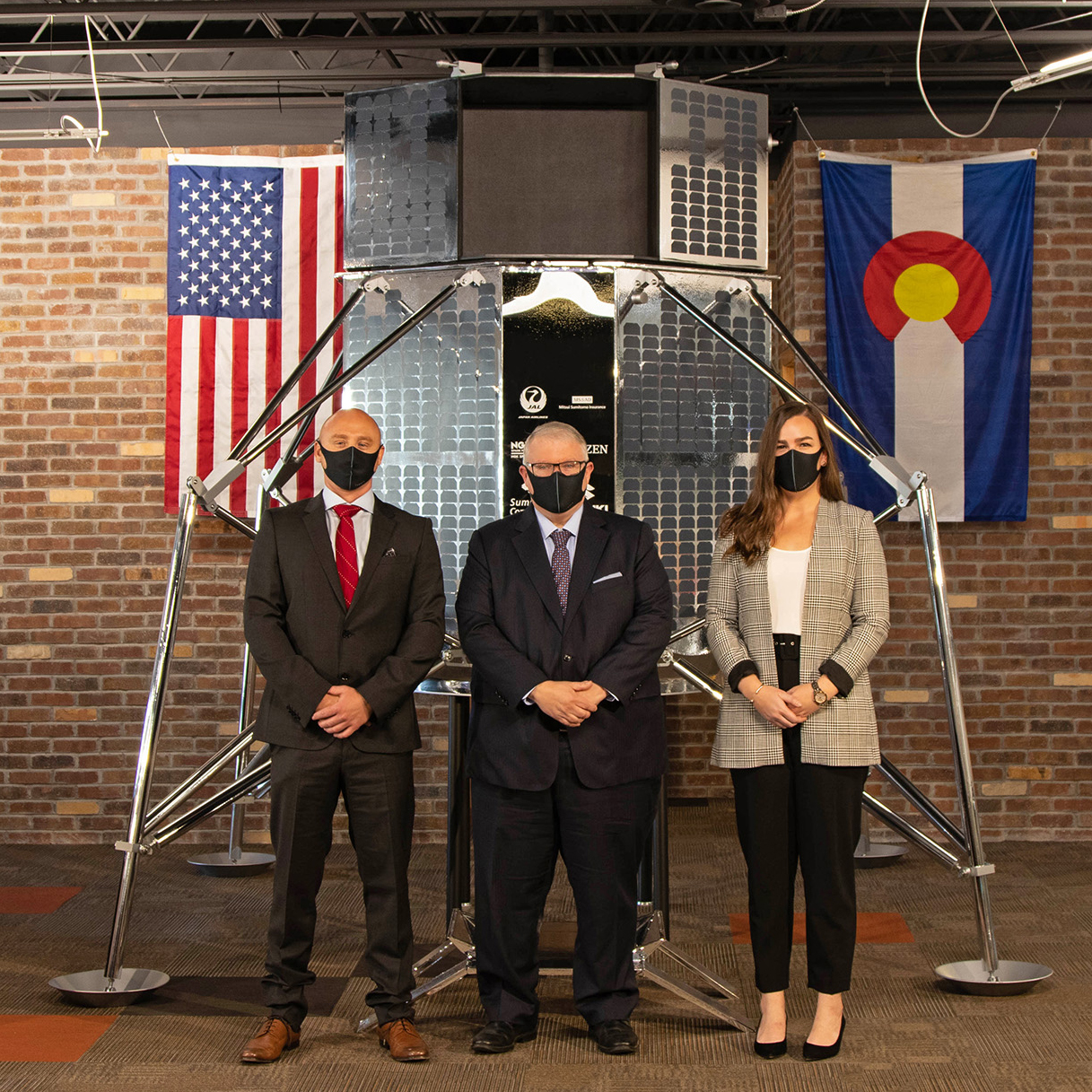
Promoted the Nation’s Leadership in Satellite Navigation
OSC continued to host the offices and meetings of the National Executive Committee for Space-Based Positioning, Navigation, and Timing (PNT), which manages the Global Positioning System (GPS) as a national asset. NIST completed a study estimating GPS generated $1.4 trillion in economic benefits since its inception. The committee coordinated the submission to NTIA and FCC of a landmark report, led by the Department of Transportation, establishing technical thresholds to prevent harmful interference to GPS users from LTE services. OSC led the Department’s participation in the development of an Executive Order on Strengthening National Resilience through Responsible Use of PNT Services and a Space Policy Directive on U.S. Space-Based PNT Policy. NIST played a leading role in implementing the EO, establishing a GPS-independent source of time distribution and developing a PNT Profile under the NIST Cybersecurity Framework to reduce over-dependence on GPS in critical infrastructure. OSC released a GPS-based curriculum for science, technology, engineering, and math (STEM) education used in classrooms across the nation.
Promoted the Growth of Space Commerce Through Effective Spectrum Policy
Secretary Ross, in concert with the Office of Science and Technology Policy and the Assistant Secretary for Communications and Information, published recommendations for improving the global competitiveness of the U.S. space sector through radio frequency spectrum policies, regulation, and U.S. activities at the International Telecommunications Union and other multilateral forums. Through NTIA, the Department advocated for the FCC’s authorization of the use of Galileo satellite navigation equipment in the United States.